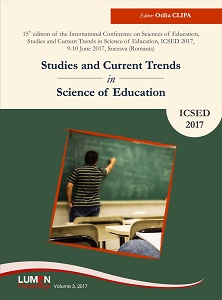Ecological Literacy in the Context of Institutionalized Education. Psych-Pedagocical Attributes
Ecological Literacy in the Context of Institutionalized Education. Psych-Pedagocical Attributes
Author(s): Adriana Muntean, Stela Ginju
Subject(s): Social Sciences
Published by: Editura Lumen, Asociatia Lumen
Keywords: Ecological education; ecological literacy; Ecological activism.
Summary/Abstract: This study proposes an analysis of the conceptual framework to be fastened to the environmental issues reflected psychologically. The valued concepts are “ecological literacy”, “ecological identity”, “environmental activism”, and “environmental education”. Simmons (1998) defines ecological literacy as the ability to process information in order to make everyday decisions based on experiences in the real world that surrounds us. An environmentally literate person can discuss environmental issues and actively harness the skills to improve his environment. Educating people in order for them to become ecologically literate means preparing them to become “global citizens” with two concerns: analysis of the world around them and engaging in making decisions about the actions taken by their societies (Mac, 2003).Delimitation of the literature reveals three levels of ecological literacy (Roth, 1992): (1) the nominal level – basic knowledge of how natural systems operate and their interaction with humans; (2) functional level – awareness, concern and the ability to analyze information; (3) the operational level – active behavior for environmental purposes, both individual and collective, locally and globally. Developing values, conceptualized as guiding principles important in a person’s life (Rokeach, 1973; Schwartz, 1992) is primarily a process of socialization (UNESCO, 1985), with significant implications in the formation of an ecological identity from an institutionalized education perspective (formal and non-formal).Pedagogical approach to the concept of “ecological literacy” is an essential direction in the development of the ecological activism of pedagogical training, treated from the perspective of curriculum paradigm.
Book: Studies and Current Trends in Science of Education
- Page Range: 268-277
- Page Count: 11
- Publication Year: 2018
- Language: English
- Content File-PDF

